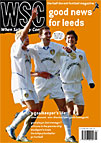 His name is enough to secure him a coaching licence, but Diego Maradona’s forays into management have convinced few of his credentials, reports Ben Backwell
His name is enough to secure him a coaching licence, but Diego Maradona’s forays into management have convinced few of his credentials, reports Ben Backwell
Following Argentina’s disastrous 2002 World Cup campaign, Diego Maradona declared from his Cuban retreat that he was willing to take over coaching the Argentine national team “for free”. “I have always said, and I repeat, that I am willing to manage the team without charging a single peso,” said Maradona, adding that he would put the team “in order”. According to polls carried out by local websites among Argentines then howling for the head of coach Rafael Bielsa, there were few takers, and the offer was discreetly ignored by the country’s football association (AFA).
Maradona’s bid was the latest of his erratic series of forays into management. At the end of 2001, he was formally awarded the title of coach, or Director Técnico (DT), by the Association of Argentine football coaches (AFTA), at a glitzy ceremony at which he was given yet another “greatest player of all time” award. There were a few sour grapes from those who pointed out that Maradona had not taken the course that is normally required for the certificate to be given. But AFTA was unapolegetic, saying it had given him the title “for the simple reason that he is called Maradona”.
At the time, Diego was offering to take over Boca Juniors, who had just completed the most successful year in their history – winning the world club championship against Real Madrid in Tokyo – under Carlos Bianchi. Again, his offer to coach the club, even if it meant “swimming all the way” to Buenos Aires, was ignored by Boca’s president Mauricio Macri.
Perhaps the scepticism that greets Maradona’s offers to coach is unfair. His only formal experiences of coaching – though many accuse him of attempting to run Boca Juniors informally during his ill fated return to the club as a player in 1996 – took place during perhaps the most troubled year of his life, with continual media harassment and drug busts involving friends and associates.
In October 1994, following his expulsion from the World Cup after failing a doping test, Maradona took charge of modest first division side Deportivo Mandiyú along with his close friend, former midfielder Carlos Fren. For the first few games, due to his lack of a formal coaching certificate, Maradona was forced to direct the team from the stands. A special permit was subsequently arranged by the AFA, but in the less than three months that a distracted Maradona stayed at the club, Mandiyú won one game, drew six and lost five.
In May 1995, he set his sights higher and – again with Fren – agreed to manage Buenos Aires’ Racing, who, although one of Argentina’s top tier clubs, had gone decades without a title and were facing bankruptcy amid mounting corruption scandals. Maradona always looked uncomfortable managing a team that, as a Boca fan, he had spent most of his life hating, although he won the trust of supporters by pulling off the club’s first away win against Boca in 20 years. He lasted just four months, during which Racing won two games, drew six, and lost three. Perhaps his most memorable feat was to get sent off during the away derby against Independiente after throwing water at a linesman. After the game, which ended in a 0-0 draw, Maradona said that he was just trying to draw the linesman’s attention to something.
The defeat of Racing president Juan De Stéfano – who had said after the Independiente scandal “Maradona is at Racing because I feel like it” – in shareholder elections in May was the signal for Maradona’s resignation. In any case, with his 15-month FIFA-imposed ban expiring in September 1995, Maradona was focusing his energies on negotiating a return as a player at Boca. This became a reality in October 1995.
A year later, Maradona temporarily distanced himself from Boca after their president Macri offered only lukewarm support during a judicial investigation of doping at the club. He then came close to becoming manager of troubled first division side Huracán before finally returning to Boca to spend the rest of a troubled last year there, in which he failed another doping test in August 1997. Two months later, he retired for good.
In 2000, following the heart attack that nearly killed him, Maradona offered to manage Argentina’s Under-21 team. The negotiations came to nothing, and Maradona complained that “when I was dying, they were stroking me like a dog and offering me the national team, and now that I am back here in Buenos Aires, nobody phones me.”
Later in the year, Maradona announced he was to leave Cuba to take over as general manager at recently promoted – and since relegated – Almagro. The deal soon fell apart though, as Maradona snubbed two Almagro games, preferring to watch Boca instead, and he was soon back in Cuba.
Argentines are sceptical about his involvement with the national team, but there are still potentially lots of takers at club level, so we may not have seen the last of Maradona as coach. He’s persistent if nothing else.
From WSC 195 May 2003. What was happening this month